Module 3 Sports. Unit 3 Language in use习题课件(共26张PPT)
文档属性
| 名称 | Module 3 Sports. Unit 3 Language in use习题课件(共26张PPT) | 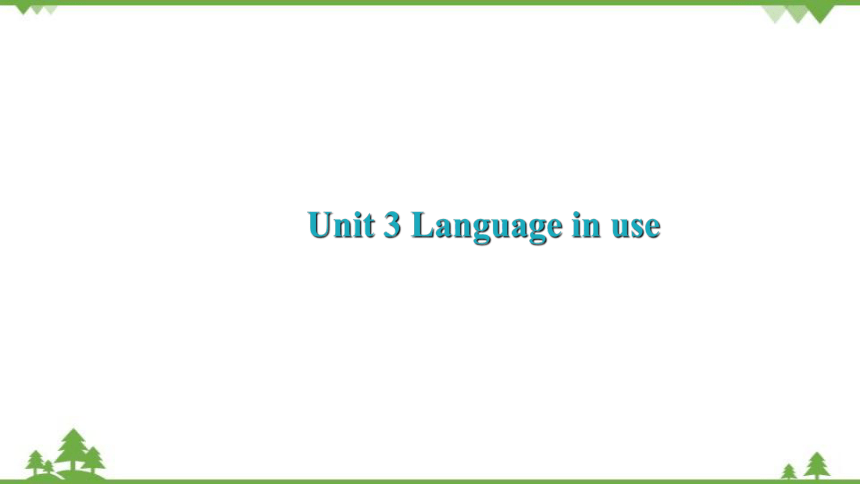 | |
| 格式 | ppt | ||
| 文件大小 | 315.0KB | ||
| 资源类型 | 教案 | ||
| 版本资源 | 外研版 | ||
| 科目 | 英语 | ||
| 更新时间 | 2022-08-13 17:27:13 | ||
图片预览

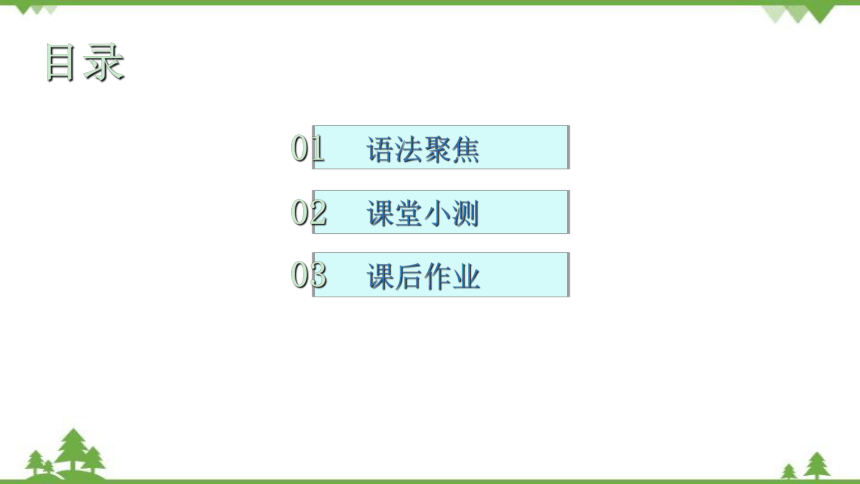
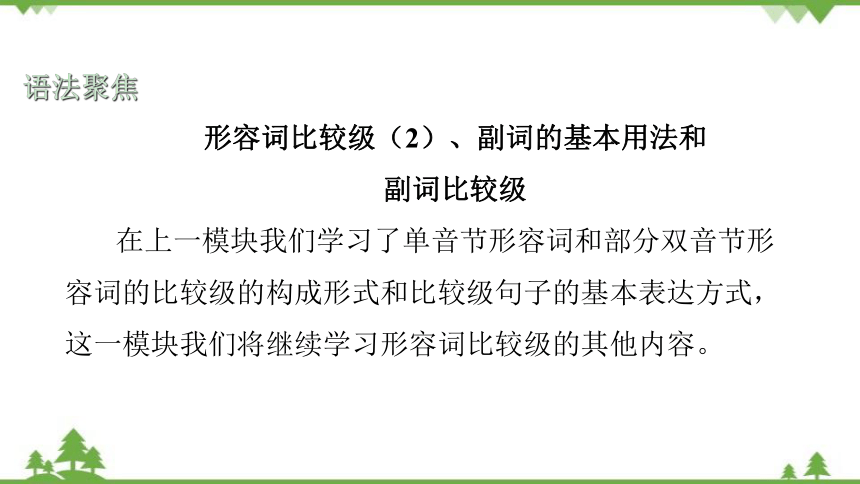
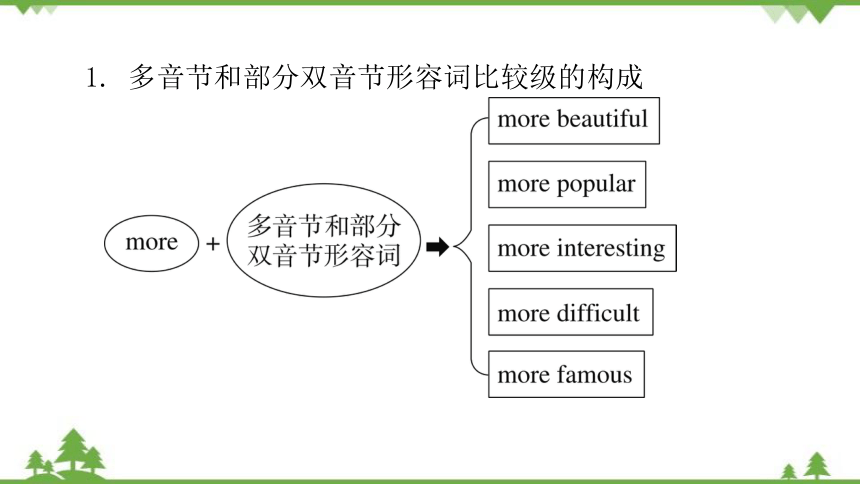
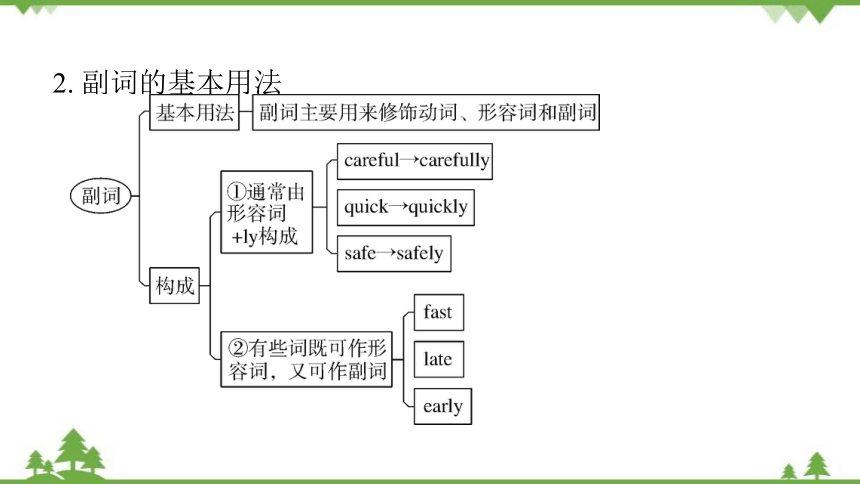
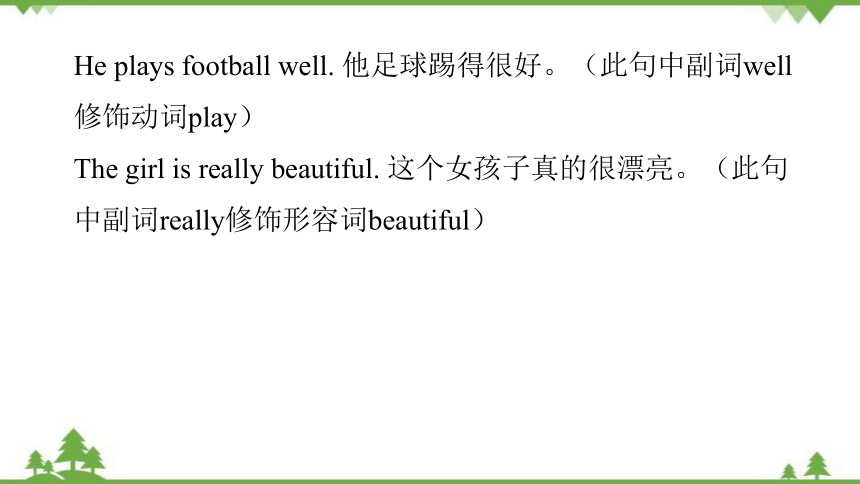
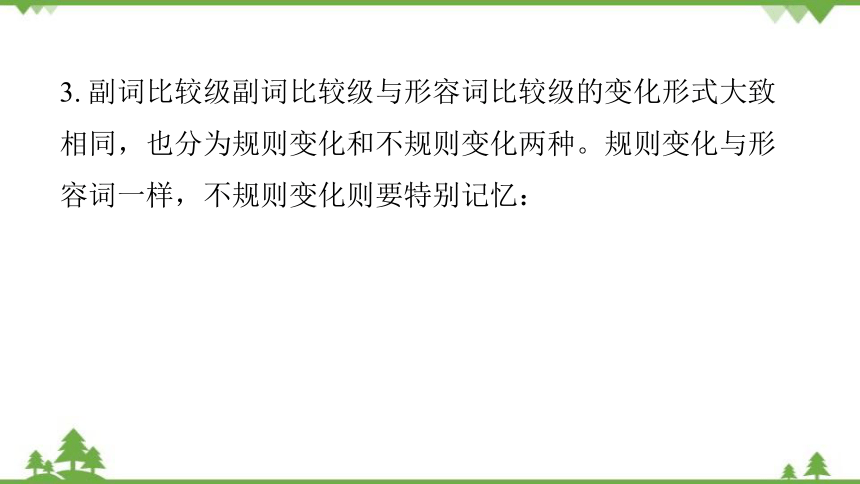
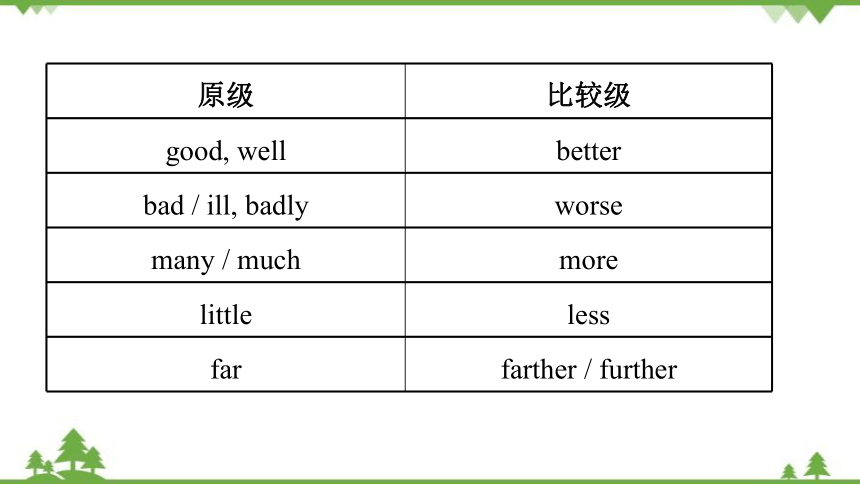
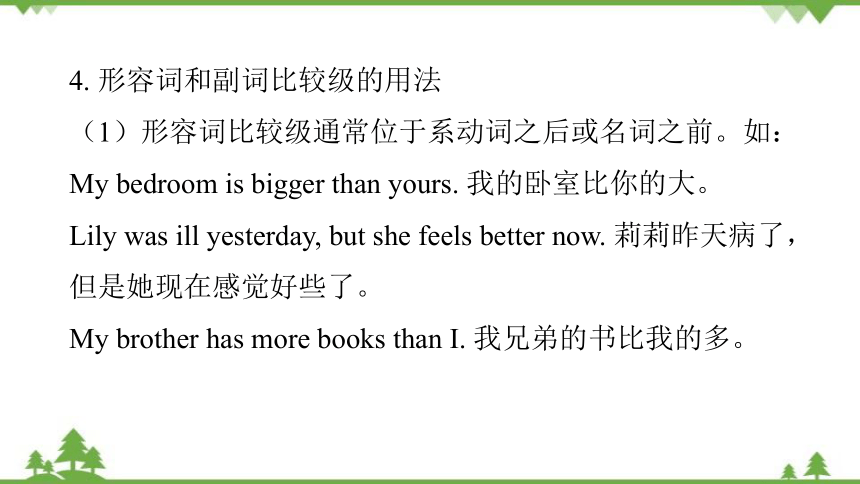
文档简介
(共26张PPT)
Unit 3 Language in use
目录
语法聚焦
01
课堂小测
02
课后作业
03
语法聚焦
形容词比较级(2)、副词的基本用法和
副词比较级
在上一模块我们学习了单音节形容词和部分双音节形容词的比较级的构成形式和比较级句子的基本表达方式,这一模块我们将继续学习形容词比较级的其他内容。
1. 多音节和部分双音节形容词比较级的构成
2. 副词的基本用法
He plays football well. 他足球踢得很好。(此句中副词well修饰动词play)
The girl is really beautiful. 这个女孩子真的很漂亮。(此句中副词really修饰形容词beautiful)
3. 副词比较级副词比较级与形容词比较级的变化形式大致相同,也分为规则变化和不规则变化两种。规则变化与形容词一样,不规则变化则要特别记忆:
原级 比较级
good, well better
bad / ill, badly worse
many / much more
little less
far farther / further
4. 形容词和副词比较级的用法
(1)形容词比较级通常位于系动词之后或名词之前。如:My bedroom is bigger than yours. 我的卧室比你的大。
Lily was ill yesterday, but she feels better now. 莉莉昨天病了,但是她现在感觉好些了。
My brother has more books than I. 我兄弟的书比我的多。
(2)副词比较级用于行为动词(实义动词)之后。如:Anna runs faster than before. 安娜跑得比以前更快了。
(3)“比较级+and+比较级”意为“越来越……”。
①单音节和部分双音节词的比较级或不规则变化,直接用“比较级+and+比较级”的形式。如:
I learn English harder and harder.我学习英语越来越刻苦了。②通过在形容词或副词前加more构成的比较级,用“more and more+形容词 / 副词”的形式。如:
Our city is becoming more and more beautiful. 我们的城市变得越来越美了。
(4)“the+比较级, the+比较级”意为“越……,越……”。如:
The more you read, the more you will know. 你读书读得越多,懂得就越多。
课堂小测
missed
elaxing
一、根据中文意思或首字母提示,用单词的适当形式填空,每空一词
1.The Smiths come here every year to spend a quiet and
r________ holiday.
2. They got up early, but they still_________________ (错过) the early bus.
score
coach
hance
3. The final_________________ (比分) of the school football match was 3∶0.
4. Mr Zhang is a football_________________ (教练)in a football club.
5. Don’t be sad. You still have another c________.
more
expensive
二、根据要求完成句子
6.Running is cheaper than cycling.(改为同义句)
Cycling is _________________ _________________ than running.
7.I like table tennis because it is more popular. (对画线部分提问)
_________________ ____________ you like table tennis
do
Why
more boring than
cheaper
safer
8. This book is boring. That book is more boring. (改为同义句)
That book is _________________ this one.
9.跑步比滑雪更经济、更安全。(根据汉语意思完成句子)
Running is _________________ and _________________ than skiing.
10.乒乓球比体操更流行。(根据汉语意思完成句子)
Table tennis is _________________ ________ than gymnastics.
more
popular
B
三、单项填空
( )11. Lucy writes as _________________ as Lily. They are both good students.
A. careful B. carefully
C. more careful D. more carefully
B
( )12. —What’s the _________________ with Will
—He misses his parents very much.
A. wrong B. matter
C. luck D. chance
A
( )13. The more junk food you eat,_________________ healthy you will be.
A. the less B. the more
C. more D. less
A
( )14. Are you sure about _________________ this time
A. his coming B. come
C. he coming D. coming
( )15. I like sports a lot and I _________________ like music.
A. too B. also
C. either D. as well
B
四、语法选择(核心素养:文化意识)
The word “sport” first meant something that people did in their free time. Later it often meant hunting wild animals and birds. About a 16 years ago the word was first used for organised games. This is the usual meaning of the word today. People spend a lot of time 17 football, basketball, tennis and many other sports. Such people play because they want
to. A few 18 are paid for sport they play. These people are called professional sportsmen. 19 may be sportsmen for only few years, but during that time the best ones can earn a lot of money. For example, 20 professional football player in England earns more than 300,000 dollars a year. The stars
21 a lot more. International golf and tennis champions 22 make more than 500,000 dollars a year. Of course, only a few sportsmen can earn as much as that.
Perhaps the most 23 thing about sportsmen and money is that the stars can earn 24 money from advertising than from sports. An advertisement for sports equipment does not simply mean “buy our things”. It says, “Buy the same shirt and shoes as …” Famous sportsmen can even advertise things like watches and food. They allow the companies to use their names or a photo 25 them and they are paid for this. Sport is no longer just something for people’s spare time.
( )16. A. hundreds B. hundred
C. hundred of D. hundreds of
( )17. A. playing B. to play C. play D. plays
( )18. A. peoples B. people’s C. peoples’ D. people
( )19. A. Their B. Theirs C. Them D. They
( )20. A. the B. / C. a D. an
B
A
D
D
C
( )21. A. earns B. earned C. earning D. earn
( )22. A. must B. need C. should D. can
( )23. A. surprise B. surprising C. surprised D. surprises
( )24. A. many B. much C. more D. most
( )25. A. Of B. with C. at D. in
D
D
B
C
A
Unit 3 Language in use
目录
语法聚焦
01
课堂小测
02
课后作业
03
语法聚焦
形容词比较级(2)、副词的基本用法和
副词比较级
在上一模块我们学习了单音节形容词和部分双音节形容词的比较级的构成形式和比较级句子的基本表达方式,这一模块我们将继续学习形容词比较级的其他内容。
1. 多音节和部分双音节形容词比较级的构成
2. 副词的基本用法
He plays football well. 他足球踢得很好。(此句中副词well修饰动词play)
The girl is really beautiful. 这个女孩子真的很漂亮。(此句中副词really修饰形容词beautiful)
3. 副词比较级副词比较级与形容词比较级的变化形式大致相同,也分为规则变化和不规则变化两种。规则变化与形容词一样,不规则变化则要特别记忆:
原级 比较级
good, well better
bad / ill, badly worse
many / much more
little less
far farther / further
4. 形容词和副词比较级的用法
(1)形容词比较级通常位于系动词之后或名词之前。如:My bedroom is bigger than yours. 我的卧室比你的大。
Lily was ill yesterday, but she feels better now. 莉莉昨天病了,但是她现在感觉好些了。
My brother has more books than I. 我兄弟的书比我的多。
(2)副词比较级用于行为动词(实义动词)之后。如:Anna runs faster than before. 安娜跑得比以前更快了。
(3)“比较级+and+比较级”意为“越来越……”。
①单音节和部分双音节词的比较级或不规则变化,直接用“比较级+and+比较级”的形式。如:
I learn English harder and harder.我学习英语越来越刻苦了。②通过在形容词或副词前加more构成的比较级,用“more and more+形容词 / 副词”的形式。如:
Our city is becoming more and more beautiful. 我们的城市变得越来越美了。
(4)“the+比较级, the+比较级”意为“越……,越……”。如:
The more you read, the more you will know. 你读书读得越多,懂得就越多。
课堂小测
missed
elaxing
一、根据中文意思或首字母提示,用单词的适当形式填空,每空一词
1.The Smiths come here every year to spend a quiet and
r________ holiday.
2. They got up early, but they still_________________ (错过) the early bus.
score
coach
hance
3. The final_________________ (比分) of the school football match was 3∶0.
4. Mr Zhang is a football_________________ (教练)in a football club.
5. Don’t be sad. You still have another c________.
more
expensive
二、根据要求完成句子
6.Running is cheaper than cycling.(改为同义句)
Cycling is _________________ _________________ than running.
7.I like table tennis because it is more popular. (对画线部分提问)
_________________ ____________ you like table tennis
do
Why
more boring than
cheaper
safer
8. This book is boring. That book is more boring. (改为同义句)
That book is _________________ this one.
9.跑步比滑雪更经济、更安全。(根据汉语意思完成句子)
Running is _________________ and _________________ than skiing.
10.乒乓球比体操更流行。(根据汉语意思完成句子)
Table tennis is _________________ ________ than gymnastics.
more
popular
B
三、单项填空
( )11. Lucy writes as _________________ as Lily. They are both good students.
A. careful B. carefully
C. more careful D. more carefully
B
( )12. —What’s the _________________ with Will
—He misses his parents very much.
A. wrong B. matter
C. luck D. chance
A
( )13. The more junk food you eat,_________________ healthy you will be.
A. the less B. the more
C. more D. less
A
( )14. Are you sure about _________________ this time
A. his coming B. come
C. he coming D. coming
( )15. I like sports a lot and I _________________ like music.
A. too B. also
C. either D. as well
B
四、语法选择(核心素养:文化意识)
The word “sport” first meant something that people did in their free time. Later it often meant hunting wild animals and birds. About a 16 years ago the word was first used for organised games. This is the usual meaning of the word today. People spend a lot of time 17 football, basketball, tennis and many other sports. Such people play because they want
to. A few 18 are paid for sport they play. These people are called professional sportsmen. 19 may be sportsmen for only few years, but during that time the best ones can earn a lot of money. For example, 20 professional football player in England earns more than 300,000 dollars a year. The stars
21 a lot more. International golf and tennis champions 22 make more than 500,000 dollars a year. Of course, only a few sportsmen can earn as much as that.
Perhaps the most 23 thing about sportsmen and money is that the stars can earn 24 money from advertising than from sports. An advertisement for sports equipment does not simply mean “buy our things”. It says, “Buy the same shirt and shoes as …” Famous sportsmen can even advertise things like watches and food. They allow the companies to use their names or a photo 25 them and they are paid for this. Sport is no longer just something for people’s spare time.
( )16. A. hundreds B. hundred
C. hundred of D. hundreds of
( )17. A. playing B. to play C. play D. plays
( )18. A. peoples B. people’s C. peoples’ D. people
( )19. A. Their B. Theirs C. Them D. They
( )20. A. the B. / C. a D. an
B
A
D
D
C
( )21. A. earns B. earned C. earning D. earn
( )22. A. must B. need C. should D. can
( )23. A. surprise B. surprising C. surprised D. surprises
( )24. A. many B. much C. more D. most
( )25. A. Of B. with C. at D. in
D
D
B
C
A
同课章节目录
- Module 1 How to learn English
- Unit 1 Let's try to speak English as much as possi
- Unit 2 You should smile at her.
- Unit 3 Language in use .
- Module 2 My home town and my country
- Unit 1 It's taller than many other buildings.
- Unit 2 Cambridge is a beautiful city in the east o
- Unit 3 Language in use .
- Module 3 Sports.
- Unit 1 Nothing is more exciting than playing tenni
- Unit 2 This year we training more carefully.
- Unit 3 Language in use .
- Module 4 Planes, ships and trains .
- Unit 1 He lives the farthest from school.
- Unit 2 What is the best way to travel.
- Unit 3 Language in use .
- Module 5 Lao She Teahouse.
- Unit 1 I wanted to see the Beijing Opera.
- Unit 2 It descibes the changes in Chinese society.
- Unit 3 Language in use .
- Module 6 Animals in danger.
- Unit 1 It allows people to get closer to them .
- Unit 2 The WWF is working hard to save them all.
- Unit 3 Language in use .
- Revision module A
- Module 7 A famous story
- Unit 1 Alice was sitting with her sister by the ri
- Unit 2 She was thinking about her cat.
- Unit 3 Language in use .
- Module 8 Accidents
- Unit 1 While the car were changing to red, a car s
- Unit 2 I was trying to pick it up when it bite me
- Unit 3 Language in use .
- Module 9 Population
- Unit 1 The population of China is about 1.37 billi
- Unit 2 Arnwick was a city with 200,000 people.
- Unit 3 Language in use .
- Module 10 The weathe
- Unit 1 It might snow.
- Unit 2 The weather is fine all year round.
- Unit 3 Language in use .
- Module 11 Way of life
- Unit 1 In China ,we open a gift later.
- Unit 2 In England, you usually drink tea with milk
- Unit 3 Language in use .
- Module 12 Help
- Unit 1 What should we do before help arrives?
- Unit 2 Stay away from windows and heavy furniture.
- Unit 3 Language in use .
- Revision module B
